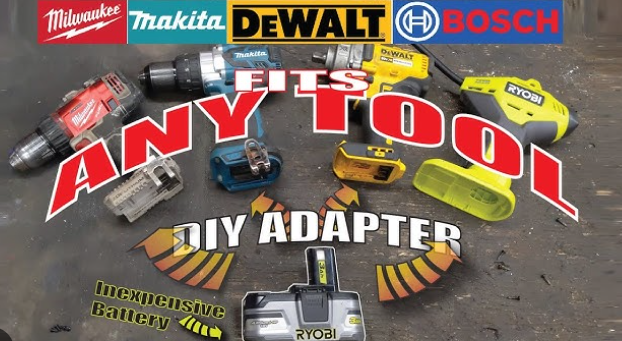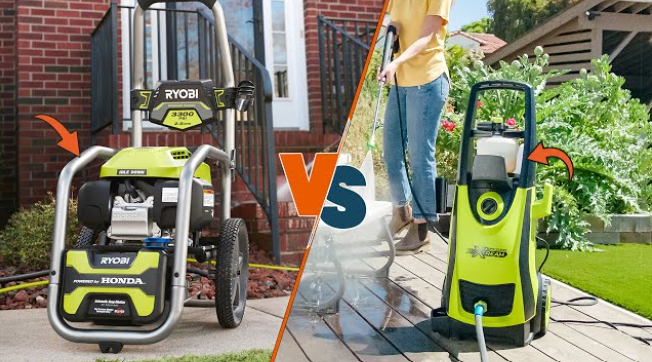Can You Use Another Battery in a Ryobi?
Ryobi tools are known for being reliable, affordable, and easy to use. The brand has built a strong reputation among homeowners, hobbyists, and professionals who want dependable power tools without breaking the bank.
One of Ryobi’s biggest advantages is its battery system — a single battery that fits many tools. This makes projects more convenient and saves time and money.
Still, many users ask the same question: Can you use another battery in a Ryobi tool? Maybe you already own batteries from other brands like DeWalt, Milwaukee, or Makita and wonder if they can work. It’s a fair question, especially since all these batteries look similar. But the truth is more complex.
This article explains everything you need to know before trying to use another battery in your Ryobi. It covers compatibility, safety risks, adapters, and expert tips to help you protect your tools and batteries.
Understanding Ryobi Battery Systems
Ryobi has two main cordless platforms that power most of its tools:
-
Ryobi ONE+ 18V System – This system is used for drills, saws, blowers, and many indoor and light-duty outdoor tools.
-
Ryobi 40V System – This one powers larger outdoor equipment like mowers, chainsaws, and hedge trimmers.
Each system uses a different voltage and connector design. The 18V batteries cannot fit 40V tools, and 40V batteries cannot fit 18V tools. Ryobi designed it this way to keep tools safe from electrical overload and damage.
Inside each Ryobi battery pack are lithium-ion cells that deliver the right amount of power. These cells communicate with the tool’s electronics to control performance and temperature. This system works perfectly — as long as you use the right battery.
Why Ryobi Batteries Are Not Universal
At first glance, many power tool batteries look almost identical. They have similar shapes, voltages, and charging ports. But each brand uses its own connection pattern and internal communication system.
Ryobi batteries are made to match Ryobi tools only. The shape, terminal design, and electronic control system are unique. This is why a DeWalt, Milwaukee, or Makita battery cannot directly connect to a Ryobi tool. Even if the voltage looks similar, the electrical communication between the tool and battery will not match.
This mismatch can cause tool failure, poor performance, or even electrical shorting. For that reason, Ryobi officially recommends using only their branded batteries and chargers.
Can You Use Another Brand’s Battery in a Ryobi Tool?

The short and honest answer is no, not safely or directly. Each power tool brand builds its battery system around its own voltage, terminals, and safety electronics. These systems do not communicate with other brands.
Some users do manage to fit another battery into a Ryobi tool by using adapters. But this is never risk-free. The voltage may differ slightly, the fit may not be secure, and the power flow might not match the tool’s needs. Over time, this can damage your Ryobi tool, drain your battery faster, or void your warranty.
Using Battery Adapters — What to Know
Battery adapters have become popular because they let users connect a battery from one brand to a tool from another. You can find adapters that let you use DeWalt or Milwaukee batteries in Ryobi tools.
These adapters act as a bridge between the two systems. They make the battery fit physically and connect the terminals so power flows into the tool.
Pros of Using Adapters
-
Saves money if you already own batteries from another brand
-
Lets you continue work without waiting for a Ryobi battery to charge
-
Works for short-term use or emergencies
Cons of Using Adapters
-
May cause loose or unstable electrical connections
-
Voltage and current may not match exactly
-
Overheating can occur during long or heavy use
-
Often voids tool and battery warranties
-
May not fit perfectly, causing vibration or slippage
Adapters can be useful in rare situations, but they should never replace the proper battery system. They are best for light-duty, temporary use.
Dangers of Using Non-Ryobi Batteries

Using another brand’s battery can lead to serious issues. Here are some of the most common problems users face:
1. Voltage Differences
Ryobi 18V tools are tuned for 18V batteries. Some other brands label their batteries as 20V, but those often measure peak voltage, not working voltage. Even a small mismatch can strain the motor, reduce efficiency, and shorten tool life.
2. Heat Build-Up
When current flow is unstable, both the battery and tool heat up faster. Over time, this heat can melt wiring or damage battery cells.
3. Battery Protection Failure
Ryobi batteries have built-in protection circuits to prevent overcharging and overheating. A non-Ryobi battery may not communicate with these circuits properly, removing that layer of safety.
4. Warranty Loss
Ryobi clearly states that using non-official batteries voids the warranty. Any damage caused by a third-party battery will not be covered.
5. Fire and Short Circuit Risks
Unstable electrical contact can cause sparks or battery swelling. In rare cases, it may even cause fire.
How to Identify Battery Compatibility
Before using any battery, check these details:
-
Voltage: Make sure the voltage matches the tool exactly (18V for ONE+, 40V for 40V tools).
-
Terminal Layout: Check the connector pins and shape. They should fit perfectly without force.
-
Battery Type: Only use lithium-ion batteries, as NiCad batteries may not work properly with modern tools.
-
Labeling: Always look for “Ryobi ONE+” or “Ryobi 40V” markings for guaranteed compatibility.
Even if another battery physically fits, it may not deliver power safely. Always double-check before inserting a new battery.
Benefits of Using Original Ryobi Batteries

Using official Ryobi batteries ensures proper performance, safety, and reliability. Ryobi designs its batteries to work with specific power requirements for each tool.
Here’s what you gain from staying within the Ryobi system:
-
Smooth and consistent power delivery
-
Proper fit with no loose connection
-
Safe charging with official Ryobi chargers
-
Full warranty protection
-
Longer battery and tool life
Ryobi’s ONE+ battery system is especially convenient. One 18V battery fits more than 200 Ryobi tools — from drills and saws to vacuums and lights. This makes it one of the most flexible tool systems on the market.
How to Maintain Ryobi Batteries
To get the best performance from your Ryobi batteries, follow these care tips:
-
Charge only with Ryobi chargers.
-
Store batteries in a cool, dry place.
-
Avoid direct sunlight or freezing temperatures.
-
Recharge before the battery is fully drained.
-
Remove the battery from the tool after use.
-
Wipe the battery terminals with a dry cloth regularly.
-
Let the battery cool down before charging again after heavy use.
Good care extends battery life and keeps your tools running strong.
Common Questions About Ryobi Batteries
1. Can I use a DeWalt or Milwaukee battery in my Ryobi drill?
No. Those brands use different voltage systems and terminals. Even with an adapter, it can damage the tool or cause poor performance.
2. Do Ryobi 18V and 40V batteries fit the same charger?
No. Each system has its own charger and cannot be mixed.
3. Are third-party Ryobi replacement batteries safe?
Some third-party batteries work well, but quality varies. Only buy from trusted sources and make sure the voltage and shape match exactly.
4. What happens if I use the wrong battery?
The tool might not start, or it could run poorly. It can also overheat or short-circuit.
5. Can I charge a Ryobi battery with another brand’s charger?
No. Chargers are built for specific battery designs. Using the wrong one can cause damage or fire risk.
6. How long do Ryobi batteries last?
With normal use and proper care, they last around three to five years. High-capacity models last longer.
7. Can I leave the battery in the charger overnight?
Ryobi chargers stop charging automatically, but it’s better to remove the battery after it’s full.
Tips for Extending Battery Performance
-
Rotate between two or more batteries to avoid overuse of one.
-
Use high-capacity batteries (4Ah, 6Ah, or 9Ah) for longer projects.
-
Avoid full discharge before charging again.
-
Keep batteries clean and dry at all times.
-
Don’t store fully charged batteries for months — use them often.
Following these tips helps keep your batteries strong and dependable for years.
Final Thoughts
Using another brand’s battery in a Ryobi tool may sound appealing, but it’s rarely a good idea. Every power tool system has unique voltage, connectors, and safety controls. Mixing brands can cause poor performance, overheating, or permanent damage.
The safest choice is always to stick with official Ryobi batteries and chargers. They deliver the right voltage, communicate correctly with the tool, and ensure reliable performance. The ONE+ and 40V systems already cover almost every tool you could need — from power drills to garden equipment.
A genuine Ryobi battery might cost a little more, but it keeps your tools safe, powerful, and long-lasting. Staying within the Ryobi system means less risk, more consistency, and peace of mind on every job.







